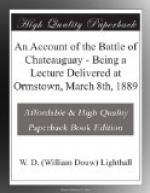De Salaberry, then seeing that the action was about to become serious on the right, left his position in the centre of the front and placed himself on the left with the troops along the bank, where, standing on a stump.[40] he could see, through his field-glass, Captain Daly with his men crossing the ford. The latter took with him such of the Beauharnois men as had rallied[41] up, and led by him, they advanced along the river-bank and made, in the words of Purdy afterwards, “a furious assault” upon the advanced guard of the Americans, whom they drove back upon themselves. “The bravery of Captain Daly,” wrote the Temoin Oculaire—whose account, it is to be remembered, was published a few days afterwards—“who literally led his company into the midst of the enemy, could not be surpassed.”
Purdy’s main body finally recovered, and charged forward, however, emerging in great force from the wood.
Captain Daly’s men, as they had been taught by Lieut.-Colonel McDonell, knelt and fired a volley kneeling. The return volley was fired by tenfold numbers, and but for that precaution would have destroyed nearly the whole of Captain Daly’s command. As it was, he received a severe wound, and with his men, several of whom were wounded and himself a second time, was compelled to retreat, which the men did in very good order under Lieut. Benjamin Schiller. The latter distinguished himself greatly. He bore off his wounded captain to a safe place, and returning, took command at request of the men. At one juncture he was engaged, hand to hand, with a very formidable adversary, whose head he cut off with a single blow of his sabre.[42]
Purdy’s force eventually were moving on in overwhelming numbers, and for a moment their shouts of victory were heard by the little force lying in suspense behind the barricades on the opposite bank. In coming out of the wood they swarmed down along the bank of the river. Now was the time for Captains Louis Duchesnay and Longtin’s companies concealed in the river-side bushes opposite. De Salaberry instantly appears upon the scene, gives the word of command, and the bushes flame out with a hidden and destructive fire. The American shouts of victory turn into cries of confusion. In the utmost disorder they make a tumultuous and precipitate retreat into the woods. Thus, at 2.30 p.m., came the failure of Purdy’s flanking movement.
As one may easily imagine, this series of incidents took several hours.
In the front, General Hampton for about an hour kept his soldiers ready in momentary expectation of attack by De Salaberry, and of hearing of Purdy’s success. When he heard that the latter had failed, however, he sent him word to withdraw his column to a shoal four or five miles above and cross over, and ordered General Izard to retire his brigade to a position about three miles in the rear, to which place the baggage had been ordered forward. Hampton thus retired, leaving De Salaberry master of the field, with scarcely 300 men in actual action, and no British guns anywhere within seven miles.[43]




